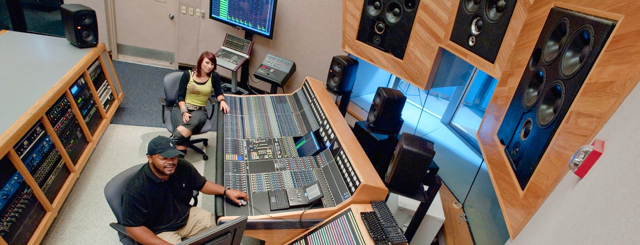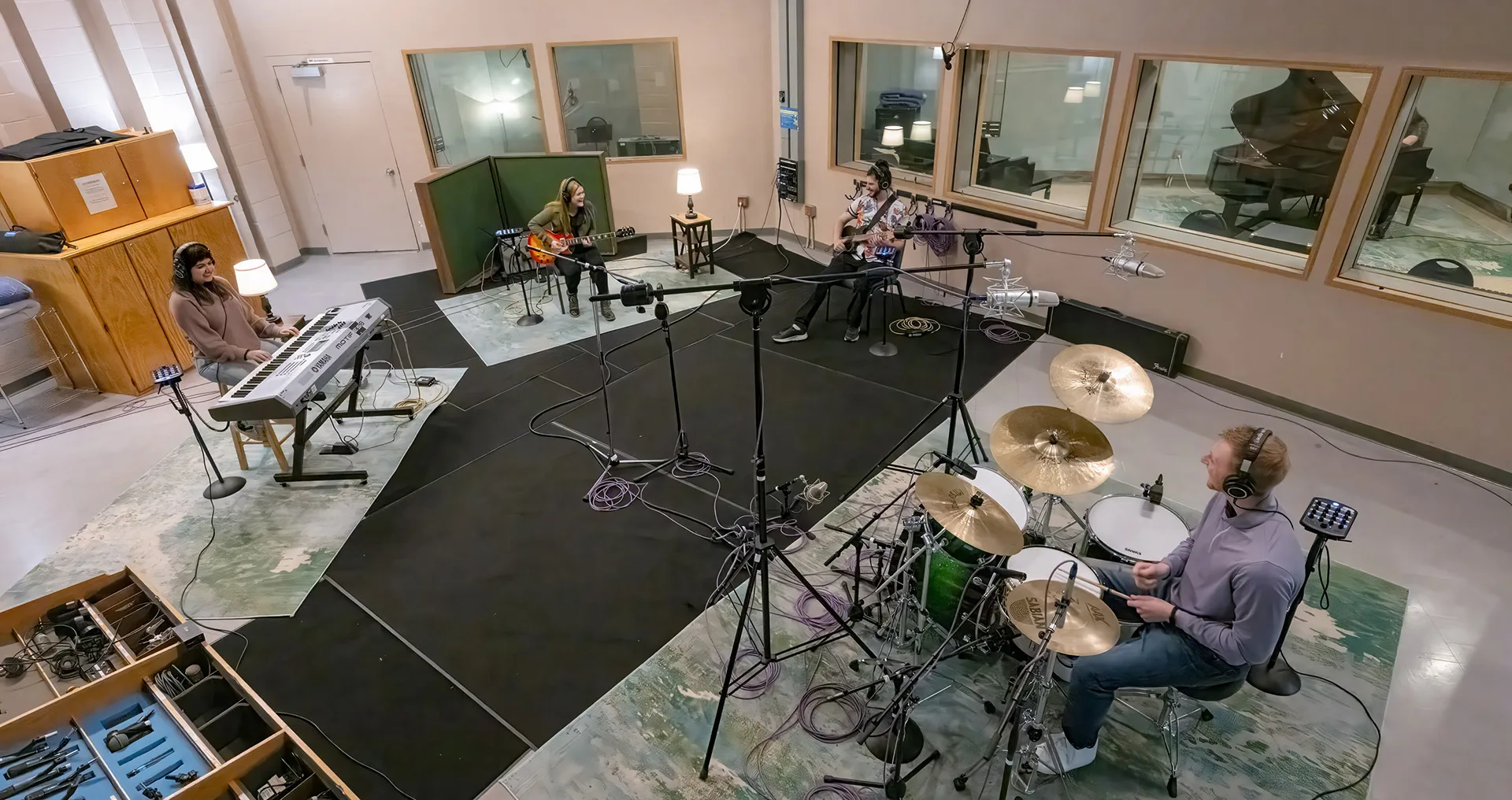
Recording Arts and Technologies
Master of Fine Arts
Recording Arts and Technologies, M.F.A.
The Master of Fine Arts in Recording Arts and Technologies in the College of Media and Entertainment at MTSU offers preparation for advanced work in audio production, recording, and integrated electronic media. Coursework helps students develop a strong foundation in audio production and an understanding of the theoretical concepts of closely related disciplines. The program fosters creativity and features a strong technical component utilizing the latest advancements in software and hardware.
Students produce a diverse range of technical and artistic projects, culminating in a final project of professional caliber. The degree plan also offers preparation for select graduates to teach at the postsecondary level in the field of audio recording and production. The six-semester program looks out for creativity as one of the primary qualities in new students. This creative background may be in audio engineering or in a field similar to "entertainment technology."
If you live in one of these states: AL AR FL GA KY LA MD MS OK SC VA; you may be able to attend MTSU at in-state rates under the Academic Common Market program.
Related Media

Recording Arts and Technologies, M.F.A.
Alum Highlight

Sarah Bailey stars, sings, acts, records, composes music, and is the creative visionary behind the streaming series "Incognita's Infamous Adventures". It all started with a song she wrote called "Gutsy Girl In Tights" about a flawed, quirky girl who also happens to be a superhero.
The song grew into a full-fledged film that Sarah created for her M.F.A. final project. Sarah met Media Arts professor Allie Sultan who believed in the vision and agreed to produce it. After months and months of filming and post production, the world of "Incognita's Infamous Adventures" has been winning awards at film festivals, getting rave reviews, and going viral on TikTok. The series is a fun and playful superhero sci-fi musical comedy that uses font names instead of swear words and the superheroes' fondest wish is to have dental insurance. Her nemesis, Badio is also her love interest and real-life husband Christoper Bailey.
Awards won:
2021 Winner Best Web Series — Orlando Film Festival
2021 Nominee Best VFX — Orlando Film Festival
2022 Nominee Best Fantasy/Scifi — Stareable Fest LA
2022 Tennessee Spirit Award — Tennessee International Independent Film Festival
Incognita is now streaming on Prime Video and The Fantasy Network. The soundtrack is available on Spotify and Apple Music along with all other major digital platforms. Season 2 is currently in the fundraising and preproduction stages.
Alum Highlight
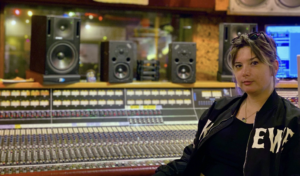
Emily Eck is the full-time engineer and studio manager for indie rock band Arcade Fire. She spent the last three years recording their newly released album "We", which has just been nominated for Best Alternative Music Album in the 2023 GRAMMYs!
Congratulations Emily!
During the process of making the album, Emily traveled around North America and Europe working with producers and artists including Radiohead's Nigel Gorich, Peter Gabriel, Father John Misty, Beck, Joy Divison's Stephen Morris, Geoff Barrow, Pulp's Steve Mackey, and more.
After graduating from our MFA program in 2014, Emily returned to her hometown of New Orleans, Louisiana to record and mix records. Her credits reflect the influence that the culturally diverse city has had on her life, which encompass genres such as Cajun, Mardi Gras Indian, Hatian, Brass Band, Electronic, and Indie Rock. Along her career, she has shared the control room with some of her own childhood heroes such as Dr. John, Irma Thomas, and The Neville Brothers. Emily received a GRAMMY acknowledgment in 2018 for her work on Lost Bayou Ramblers "Kalenda" for Best Regional Roots Music Album. She also taught a college course in recording studio techniques at Loyola University, which had previously been taught by the first woman to win a GRAMMY for Best Engineered Album, Trina Shoemaker.
Emily attributes her ability to step right into the occasion, or sit in the studio's hot seat and survive, to the fundamental time she spent at MTSU building her engineering chops.
Careers Information
This M.F.A. helps foster and develop creativity and trains students in technology for advanced work in audio/music engineering or related fields that could be described as “entertainment technology.” Graduates can use the degree program to excel in professional pursuits such as
- Audio post-production engineer
- Audio studio design and installation
- Broadcast audio
- Independent audio contractor
- Live sound engineer
- Manufacturer audio product specialist
- Mastering engineer
- Media specialist
- Recording studio engineer
- Recording studio manager
- Retail audio sales
- Sound design for film/video
- University professor
Employers of MTSU alumni include
- Alabama State University
- Asbury University
- Avid
- Belmont University
- Brickhouse Records
- Butler University
- Clair Brothers
- CNN
- GC Pro
- Hope College
- Jeff Slaughter Ministries
- Middle Tennessee State University
- National Public Radio (NPR)
- New England School of Communications
- Old Dominion University
- Rensselaer Polytech
- Sweetwater
- Tennessee Digital Video
- Top Track Recording
- Truphonic Recording Studios
- Yamaha Corporation of America

MTSU’s Career Development Center
MTSU offers a comprehensive Career Development Center that serves students throughout the full student experience and beyond. They collaborate with faculty and staff to equip students with the tools to be marketable to the world of work and continuing education.
Students can schedule an appointment or check online resources and job boards at mtsu.edu/career.
Students can find current internship opportunities by talking to faculty and visiting the University job and internship board called Handshake .
Wondering what you can do with your major? Check out our What Can I Do with A Major In guides.



M.F.A. in Recording Arts and Technologies
Links for Future Students
- Application Procedures (see below)
- Creative Portfolio Submission Guide (see below)
- M.F.A. Brochure
- Academic Common Market
- Frequently Asked Questions (see below)
- College of Graduate Studies
- Department of Recording Industry Website
- MT One Stop - Financial Aid, Registration
- Graduate Assistantship Application
Links for Current Students
- Directed Research Proposal
- Directed Production Proposal
- Final Project Approval
- Final Project Enrollment Request
- Revision Form
- Repeat Course Form
- Intent to Graduate
- Graduate Assistantship Application
- Accelerated Bachelors to Masters Contract
- Request to Stop Out
- Withdraw Intent to Graduate
Application Procedures
All application materials must be sent to the College of Graduate Studies with the exception of the creative portfolio. The portfolio is sent directly to the M.F.A. Director in the Department of Recording Industry.
To apply, please submit the following to the College of Graduate Studies:
- Application with the appropriate application fee;
- Official scores on the GRE;
- Official transcripts of all previous college work;
- A formal statement of purpose addressing the applicant’s career goals, related work experience, and how this degree will help attain the stated career goals;
- Two letters of recommendation for graduate study-one from the undergraduate major advisor if the student is a recent graduate;
- Creative portfolio – submitted directly to the M.F.A. Director
Creative Portfolio Submission Guide
The portfolio is an important piece to your admissions application and should represent your best creative achievements in the areas of audio recording, music composition, video, film, or multimedia. The portfolio may contain a broad range of materials as applicants to the program come from a wide range of backgrounds and have developed a diverse range of creative skills.
Typically, the admissions portfolio contains digital audio and/or digital video recordings. These may come from sources such as prior undergraduate coursework, recitals, home recordings, professional work, or other events. While audio quality is always important, the quality of the recording is not necessarily the admissions committee’s primary concern. The committee is looking for your creative potential.This might be expressed through the musicianship, arrangement, composition, or creative message of the work. We do not expect our new students to be professional audio engineers, but we are looking for bright creative media creators! It is also very important to document your contribution to each item you submit. For example, if you submit an audio recording, state if you were composer, performer, engineer, producer, or several of these things. The portfolio should contain:
- A comprehensive credit list for all of the entries;
- A short paragraph for each entry explaining the piece, where and when it was created and any challenges faced in the creation of the work;
- Four to six audio examples;
- Video examples (optional);
- You may also wish to include a personal introduction on video as well (optional)
Format
You may choose to submit your portfolio in one of two ways (upload or website). However, all portfolio elements must come together as a single presentation. In other words, do not submit a portion of the portfolio in one format and the rest in another. Below are descriptions of the options.
The portfolio is sent directly to the M.F.A. Director in the Department of Recording Industry. All other application materials (GRE scores, letters of recommendation, letter of intent, and transcripts) must be sent to the College of Graduate Studies.
Option 1 – File Transfer
Upload all of your portfolio materials together using audiomfa.wetransfer.com. It is important when using this option that all elements (documentation, audio, and video) are contained within one computer ”folder” and uploaded as a single file. Do not make multiple uploads (i.e. one for each recording). For example: Create a folder on your computer and name it
“Lastname_Portfolio”. Place the following in the folder:
- Word file or pdf of credits and documentation
- 01_Song1
- 02_Song2
- 03_Video1, etc.
All uploads must to to audiomfa.wetransfer.com. Do not use Google Drive, Dropbox or any other file transfer service.
- Go to audiomfa.wetransfer.com
- Click “Select Folder” and select your portfolio folder
- Upload your files
Option 2 – Website
Alternatively, you may assemble your portfolio into a website presentation. All audio and video would reside on your site and you would simply send us a link to the site. Be sure to include all credits and appropriate descriptions of the creative projects on the website. Send the website link to [email protected].
Frequently Asked Questions
Is the MFA in Recording Arts and Technologies right for me?
The MFA program focuses on sound recording, music production, audio technology, and related media. Students who excel in the program typically have undergraduate degrees and/or prior experience in music, music technology, audio production, or media production.
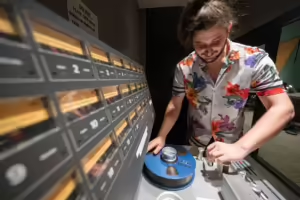
The primary qualities sought in new students is creativity with digital media. This creative background may be in audio recording, music, music technology, or film & video. Though creativity is fostered and developed throughout the program, a creative background is expected of all incoming students.
Creativity is demonstrated through the admissions portfolio during the admissions process. The MFA is not an appropriate degree for someone who does not have previous creative output in sound recording or music.
Do I need an undergraduate degree in audio engineering?
A previous degree in audio engineering/music technology isn’t required, but some students with little or no audio background may be asked to complete foundation audio courses in the summer before starting the program.
Though some MFA students have previous degrees in audio engineering/music technology, we do accept students with other degrees. Any degree can be appropriate if the student has prior experience in music, sound recording, or video production that can be demonstrated through the portfolio.
How soon can I start?
The MFA accepts new students in the fall term. Applications are reviewed beginning in March each year.
When should I apply?
The admissions committee will begin looking at new applications in late March and will continue to review applicants until all places are filled. Students who complete their application by the first week of March will be in the first group of applications reviewed. Since enrollment is limited, you will want to be in the first pool of applicants.
How many students will you accept each year?
The MFA accepts between 12 and 14 students each fall.
What is the tuition cost?
Specifics on tuition and fees can be found here: https://www.mtsu.edu/tuition/
Tuition rates depend on whether you are an in-state or out of state student. Students who are residents of Tennessee pay in state tuition. Students from several states in the southeast can get in state tuition through the “Academic Common Market.” program. This is a group of states that have agreements permitting graduate students who are permanent residents of those states to enroll at MTSU at the in-state tuition rate. This provides a significant savings.
Is financial aid available?
Federal financial aid is available for all graduate programs at MTSU. The MT One Stop is a great place to learn about and apply for financial aid. The MT One Stop provides integrated services in the areas of financial aid, registration, tuition, billing, and transcripts.
The MFA has a few graduate assistantships to award each fall. These may be awarded to incoming students and are sometimes awarded to students currently in the program who have shown the aptitude for teaching an undergraduate course in our department.
Assistantships are awarded on a competitive basis. It is recommended that applications for assistantships be submitted early in the application process since the admissions committee may begin awarding assistantships as early as March.
Consideration for an assistantship requires that the applicant has submitted all the materials required for admission, as those materials comprise the primary means of evaluating the candidate’s suitability for an assistantship. To apply for an assistantship complete the Graduate Assistantship Application and send a current resume to the MFA Director [email protected].
Residents from the following states are eligible to enroll at the in-state tuition rate through Academic Common Market agreements: Alabama, Arkansas, Florida, Georgia, Kentucky, Louisiana, Maryland, Mississippi, Oklahoma, South Carolina, Virginia, and West Virginia.
What is the admissions process like?
Admissions are competitive and an applicant’s materials are compared with those of all other applicants. The primary factors considered in determining a student’s suitability for admission include the creative portfolio, undergraduate GPA, GRE scores, letters of recommendation, and the letter of intent.
The quality of the creative portfolio is often the determining factor in admission.
Review of applications by the MFA Admissions Committee will begin in late March and a limited number of students will be accepted. Admissions are competitive and your materials are being compared with all other applicants. This process may take several weeks, however, places could also be filled in a shorter time. It is to your advantage to have your application submitted by April 1st. Later applications will be considered, but there will be the possibility that all the places in the MFA may already have been filled.
What should be included in a creative portfolio?
The portfolio should be representative of your creative achievements in the areas of audio recording, composition, songwriting, video, film, multimedia, web design, or other areas of digital media. Most applicants’ portfolio works will come from just one or two of the areas described above, however, some will have done creative work in more than one of these fields.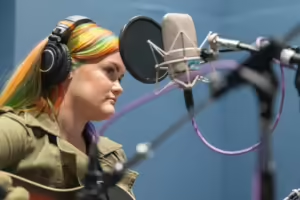
It is very important to document your contribution for each item you submit. For example, if you submit an audio recording, state if you were the composer, performer, engineer, producer, or did several of these tasks. The admissions committee will be evaluating what your specific contributions were to each project.
The portfolio has no specific guidelines because applicants come from a wide variety of creative backgrounds and each student’s portfolio will reflect their particular expertise, however a professional presentation of materials is expected.
Submit what you think is your best work. This may only be three or four examples but may include as much as you wish. If you have extended examples (a 20 minute video documentary or a dance mix, for example) you may wish to edit them. In addition to your submissions, include a list of ANY other projects on which you have participated and list your job on each project. In your portfolio documentation list the hardware and software with which you are familiar. List related technologies with which you are familiar and describe your competency. This might include: Photoshop, Final Cut Pro, iMovie, etc.

CONTACT US
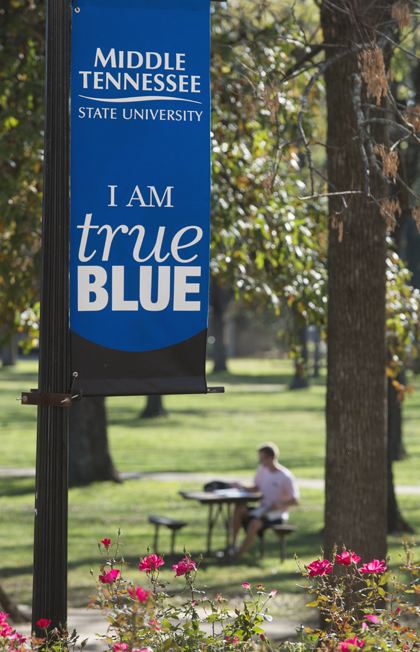
Please fill in the form below and we will contact you very soon










